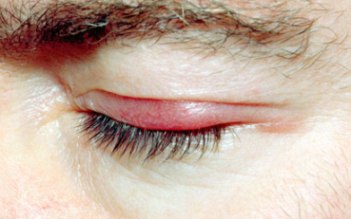A swollen eyelid can be caused by a number of different reasons but the most common causes include allergy apart from eye infections, an injury to the eye and sometimes trauma can also result in a swollen eye. In some cases like ocular herpes, orbital cellulitis and Graves’ disease, a swollen eye is just a symptom and indicates the presence of a problem that can result in sight loss in some cases as well. The swelling can occur below or above the eyelid on both eyes.
The swelling is caused by the presence of excess edema in the tissues that are near the eye or can be caused by inflammation as well. It is imperative that you visit your ophthalmologist for a complete checkup in case your swelling does not go away in a normal period of time or is getting worse with the passage of time.

Possible Causes of Swollen Eyelid
Allergies
There are a number of allergies which can cause swelling in the tissue around the eyelid. The allergic reaction which causes this swelling is mostly mild but sometimes the swelling is caused by a critical allergic reaction.
The swelling can be caused by a reaction to dust or cosmetics or even pollen.
An allergic reaction to the bite of an insect can also result in a swollen eye.
Such swelling is also indicative of reaction to animal dander.
Penicillin or codeine can also trigger an allergic reaction which causes such swelling on the eyelid.
A swollen eye can also be caused by an anaphylactic allergic reaction.
Infections
Apart from allergic reaction, swelling in the eyelid can also be caused by an infection. Some of the most common infectious causes of this swelling are:
Cellulitis is a skin infection which can result in swelling above or below the eyelid.
A viral herpes infection can also result in a swollen eyelid.
An infection of the sinus can also result in eyelids which are swollen.
An eyelash follicle which has been infected can also cause tissue around the eyelid to become swollen.
Mumps and Dacryocystitis are also infections which can cause eyelid swelling.
Conjunctivitis which is also known as pink eye causes the eye surface to become inflamed. Apart from causing itching in the eye, conjunctivitis also results in swollen eyelids.
Meibomian gland can become inflamed when infected by bacteria. Such an infection is called stye which also causes the eyelids to become swollen.
Chalazion which is similar to stye in some ways also results when the meibomian gland becomes blocked. However, it results in a sebaceous cyst which is hard. The infection also results in eyelid becoming inflamed.
Improper use of contact lenses or using them inappropriately can also cause an infection that result in swollen eyelids.
Trauma
Inflammation of the tissue around the eyelids can also be caused by a trauma or an injury. Some of the most common traumatic causes of such swelling include:
A foreign object entering the eye can causes swelling of the eyelids.
Surgery of eye or face can sometimes cause eyelids to swell.
An injury to the eye is also a reason because of which eyelids can swell.
Eyelids can also swell if there are burns on the face.
Facial burn
This video on eye health is brought to you by a doctor. Check it out to learn more about the most common cause of swollen eyelid—conjunctivitis:
Symptoms Associated with Swollen Eyelid
Common symptoms of swollen eyelids
Irritability in the eye
Scratching sensation in the eye
Bruising of the inflamed eyelid
Discharge of water from the affected eye
Pain felt in the eye
Headache, sneezing and malaise (if the root cause is allergy)
Discharge of a sticky solution from the swollen eyelid
Serious symptoms of swollen eyelids that need immediate treatment
Giddiness
Dyspnea (Shortness of breath)
Fever
Blurred vision
Swollen tongue which is the symptom of anaphylactic shock
Oozing of blood from the eye
Unrestrained twitching of the eye
Excessive swelling of the eyelids which causes it to bulge out
Inability to control eyelids or movement of the eye
Treatments for Swollen Eyelid
Medical products
In case of an allergy being the cause of the swelling, mild steroids drops, antihistamine eye drops and artificial tears are usually prescribed by the optometrist.
Swelling of eyelids caused by viruses and infections is treated with antibiotics, antiviral eye drops and anti-inflammatory ointments.
Home remedies
Home remedies can also be used for treating mild instances of eyelid swelling. Refraining from rubbing the affected eye, not wearing contact lenses until the swelling subsides and applying a cold compress over the swollen eyelid are some of the home remedies that you can use for this purpose.
If the swelling does not respond to any of the conventional treatment methods and begins to worsen then it is best to see your eye doctor immediately.
How to Prevent Swollen Eyelid
Wearing protective sunglasses can help you in preventing eye injuries which are among the common causes of eyelid swelling. For instance, making use of sunglasses made of polycarbonate is a good way of protecting the eyes. Other tips that you can follow for preventing swollen eyelids include:
Reduce your intake of caffeine, alcohol and sodium
Drink water as much as possible, rest as much as you can and increase your intake of vitamins
Get yourself tested for allergies and then stay away from the allergens and eye irritants that might trigger an allergic reaction like tea bags, cucumber and hemorrhoid cream.
Don’t make use of eye drops that have preservatives present in them.
Always your perfume-free and hypoallergenic make-up items to minimize the chance of an allergic reaction.

View All Comments /Add Comment